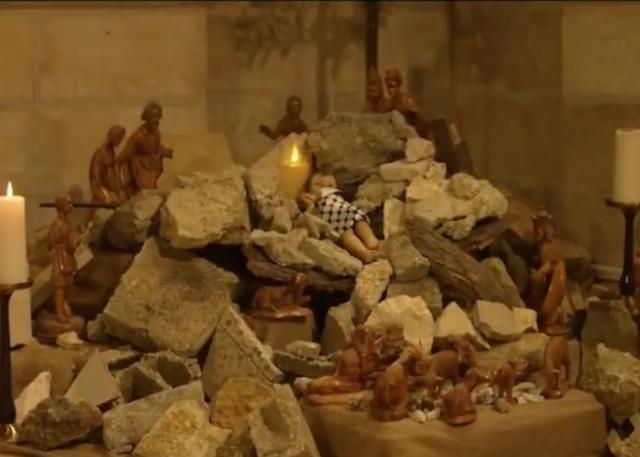Bethlehem, once bustling with Christmas festivities and revered as the birthplace of Jesus, presented a stark contrast this year. The city, which has traditionally been a magnet for tourists during the holiday season, was eerily quiet as the Palestinian Authority suspended Christmas celebrations. This decision, officially attributed to the ongoing conflict with Hamas, left Bethlehem's Manger Square, usually vibrant and festive, devoid of its characteristic holiday cheer.
The absence of the usual Christmas tree and festive lights in Manger Square was a visual representation of the area's dwindling Christian population. Historically, Bethlehem was predominantly Christian, but the decades following the Oslo Accords have seen a dramatic shift. The Christian community, once constituting over 80% of the city's population, now accounts for less than 12%. This decline is often linked to the increasing influence of radical Islamist elements and subsequent unrest, prompting many Christians to leave.
Lying through omission
— David Collier (@mishtal) December 24, 2023
Rana DOES NOT TELL YOU Bethlehem's Christian population fell from 86% to 10%. Nor that most of the Christians fled Muslim persecution and she does not tell you that this may be why the Muslim majority felt ok to cancel Christmas.https://t.co/yDwB4PAOOC
Palestinian security forces patrolled the desolate square, a stark contrast to the joyous crowds of previous years. Local businesses, particularly gift shops, felt the impact deeply. The weather, marked by relentless rain, added to the somber mood, further discouraging the few visitors who ventured out.
Brother John Vinh, a Franciscan monk from Vietnam, expressed his dismay at the situation to the Associated Press, noting the absence of the usual celebratory atmosphere. "This year, the darkness seems more profound, without the Christmas tree and lights," he lamented. The nativity scene, usually a focal point of joy and color, was now surrounded by barbed wire, symbolizing the prevailing sense of despair. In fact, the Palestinians have exploited the Christian nativity scene by placing baby Jesus not in a manger, but on a bed of rubble. This propaganda is an extension of a larger campaign meant to gain Christian sympathy by calling Jesus a Palestinian despite Jesus having been born in Judea and dying long before the area was renamed.
Local business owners echoed these sentiments. Christmas Eve, typically the busiest day for Bethlehem's businesses, was significantly subdued. One business owner said "Usually, we're bustling from morning till midnight. This year, it's just a handful of journalists escaping the rain," Salameh commented. He estimated his business was operating at a mere 15% of its normal capacity, struggling to cover even basic operating costs.
While the Palestinian Authority canceled Christmas in Bethlehem, the birth town of Jesus, this is what Christmas is looking like in the Israeli city of Nazareth, where He grew up. pic.twitter.com/LbToD9Ac4X
— Dr. Maalouf (@realMaalouf) December 16, 2023
The cancellation of Christmas festivities has dealt a significant blow to Bethlehem's economy, heavily reliant on tourism, especially during the Christmas season. The conflict has also led to major airlines canceling flights to Israel, exacerbating the economic strain. Over 70 local hotels have reportedly closed, resulting in widespread unemployment.
The broader context of the conflict is equally grim. The Israeli-Palestinian confrontation has escalated significantly, with substantial casualties reported on both sides. The Gaza Strip, governed by Hamas, has seen extensive devastation, with a large portion of its population displaced. The hostilities were triggered by a deadly attack on southern Israel by Hamas militants, claiming over 1300 civilian lives and leading to a significant military response from Israel.
This turmoil has also affected life in the Palestinian areas of Judea and Samaria (West Bank). Bethlehem and other Palestinian towns are now more isolated due to increased security measures, impeding the movement of Palestinians and affecting their ability to work in Israel. Many Palestinians perceive these restrictions as collective punishment for the actions of Hamas.
At the #Newsstand today!12/24/2023: #nypost :
— The Daily News Opinion 📰 (@TheDailyPretzel) December 24, 2023
SILENT NIGHT: "War cancels Christmas in Bethlehem" #TDNO OP: But not! "on Earth as it is in Heaven" 🙏✝️🙏 pic.twitter.com/PS1au1LeEh
The complex dynamics of the conflict are further complicated by public opinion. Polls indicate a substantial portion of the Palestinian population supports Hamas and the October 7th attacks which were brutal and barbaric. These results influence Israeli policy decisions regarding work permits and trade with the Palestinian territories. The Palestinian Authority, criticized for its financial management, including the controversial "pay-to-slay" program, faces challenges in fostering economic stability independent of Israeli trade.
Bethlehem's desolate Christmas is not just a reflection of religious and cultural loss but also a vivid illustration of the deep-seated political and economic issues plaguing the region. The impact of these ongoing conflicts continues to reverberate through every aspect of life, from the spiritual to the mundane, leaving communities on both sides in a state of uncertainty and hardship.


